The Hidden Battle of Discharged Cadets: A Struggle for Recognition and Support in India's Military Academies
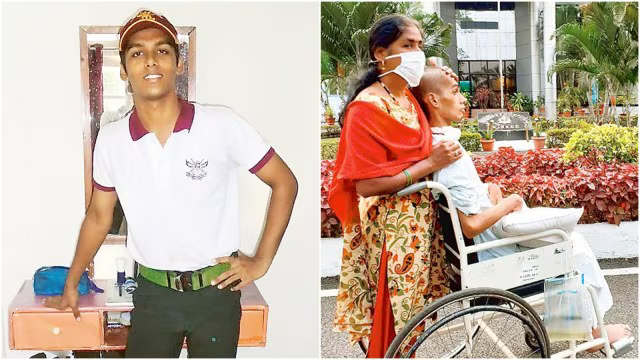
From an early age, Vickrant Raj aspired to don the Army uniform. Today, however, he speaks with difficulty and requires assistance with every movement. Yet, whenever he sees an Army film on TV, his eyes brighten as he envisions making a contribution. Shubham Gupta once imagined himself piloting a fighter jet; now, he struggles to hold a glass of water. Kishan Kulakarni relies entirely on his mother, a former schoolteacher, for even the most basic daily activities. Harish Sinhmar, once filled with promise, has lost his zest for life.
These individuals trained at India's premiere military institutions, the National Defence Academy (NDA) and the Indian Military Academy (IMA), having been selected after stringent tests and driven by a dedication to defend their country. Now, they are among many former cadets living with severe injuries, waging their battles quietly and without the recognition they once yearned for.
Since 1985, approximately 500 officer cadets have been medically discharged from these academies due to serious training-related disabilities. Many now face exorbitant medical costs, surviving on an ex gratia payment that falls short of meeting their treatment needs. At the NDA alone, about 20 cadets were medically discharged over the past five years, from 2021 to July 2025, according to official data.
Under the current regulations, these cadets do not qualify for ex-servicemen (ESM) status, which would have entitled them to the Ex-Servicemen Contributory Health Scheme (ECHS) and access to free treatment at military and empanelled hospitals. Their disabilities occurred during training, before they were commissioned as officers.
In contrast to soldiers injured in training who receive ESM status, these former officer cadets are limited to an ex gratia payment of up to Rs 40,000 per month, depending on the disability's severity. They report that this amount falls short of their basic needs, with average medical expenses alone reaching Rs 50,000 per month or more.
After years of waiting without support, their hopes now hinge on a renewed government effort for relief. However, The Indian Express found that this initiative has been bogged down in bureaucratic delays for over a year.
“Without ESM status, medical care has to be done at private hospitals, including physiotherapy, leaving families with substantial bills. Should cadets like my son not receive ESM status so he can at least obtain treatment in military hospitals?” questions Suman Raj, mother of 26-year-old Vickrant, who receives Rs 40,000 a month but faces medical bills approaching Rs 1 lakh.
“A disability pension and ex-serviceman status would allow me to live with dignity,” says Shubham. “My life is over, but this should not happen to another young cadet,” adds Harish.
Bharati, Kishan's mother, has not been able to commence physiotherapy for her son, even three years after his discharge from the NDA. “We are not from a military background, we are teachers. We do not understand the processes linked to this ex gratia,” says Bharati, a former school vice-principal.
Over the past month, The Indian Express spoke to former cadets and their families, reviewing medical records and uncovering numerous cases with severe injuries ranging from paralysis to brain damage, leaving behind shattered dreams, permanent scars, and profound emotional distress.
“It is so painful for a mother,” says Bharati.
Vickrant Raj, 26
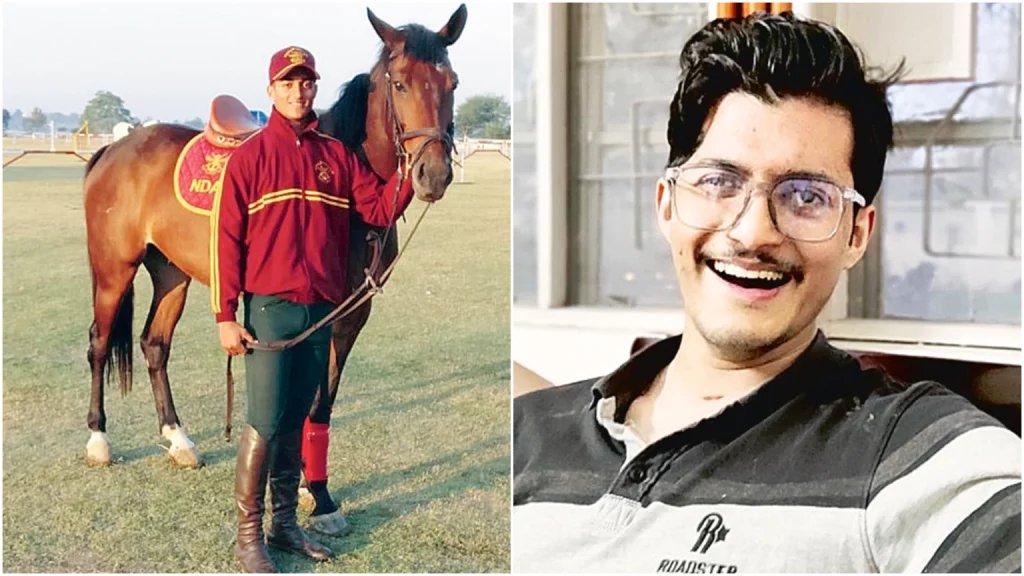
Home: Chandigarh
NDA Tenure: December 2016 to June 2020
Injury: Head injury leading to subdural haemorrhage (bleeding between the brain and its outer covering)
Monthly Ex Gratia: Rs 40,000
Monthly Medical Expenses: Around Rs 95,000
Once a promising cadet, Vickrant's life took a dramatic turn after a head injury at the NDA left him in a six-month coma. Today, he requires help to walk and perform basic tasks, and his speech is impaired.
Vickrant was ranked fourth in the NDA entrance exam, known for his discipline and potential. His mother, Suman Raj, recalls people often saying he had “officer-like qualities” and was “General material.” He excelled at the NDA until 2018 when a boxing injury led to a weeklong hospitalization.
Despite ongoing symptoms, he completed the Rovers Camp endurance test and his term exams. Later that year, he joined a football match against medical advice. The ball hit the same spot on his head, causing a collapse and necessitating brain surgery. He fell into a coma, losing significant weight in weeks.
Suman, herself the daughter of an Air Force officer, says her son committed eight years to the military, from joining the Rashtriya Indian Military College at 11 to his medical discharge from the NDA at 19. Even now, military speeches and films reignite his desire to serve. Recently, after hearing NSA Ajit Doval's speech at IIT Chennai, he asked how to join R&AW.
For his mother, the most painful aspect is watching him yearn to serve while living with the consequences of his injury, compounded by the loss of friends he once trained alongside.
Shubham Gupta, 33
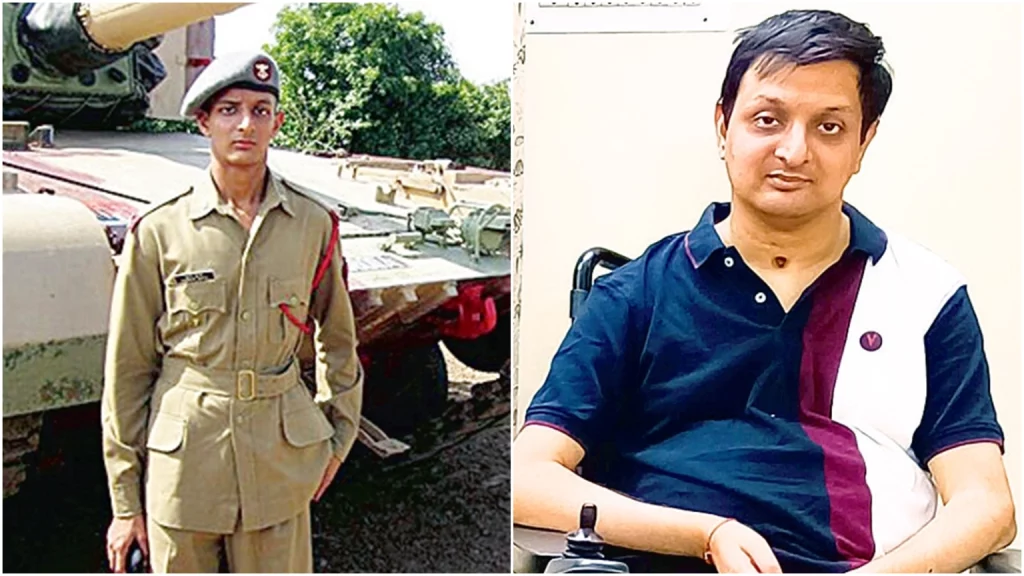
Home: Bathinda, Punjab
NDA Tenure: June 2010 to June 2014
Injury: Cervical spinal injury resulting in quadriplegia (paralysis of all four limbs and torso)
Monthly Ex Gratia: Rs 40,000
Monthly Medical Expenses: Rs 40,000
Shubham was captivated by aircraft from a young age, inspired partly by his uncle's service in the Indian Air Force. In June 2010, he joined the NDA, determined to become a fighter pilot.
However, in April 2012, a training accident altered his life. During a pool dive, he fractured his neck, leaving him paralyzed from the neck down. He endured eight surgeries and two months on a ventilator but suffered extensive nerve damage.
Shubham received long-term treatment at Command Hospital and Military Hospital in Pune, yet little recovery was evident. Eventually, he was medically discharged from the NDA. Today, he requires daily physiotherapy, two attendants, and cannot manage basic tasks alone.
His younger brother serves as a doctor in the Army, while his father is a retired soil conservation officer and his mother a retired school teacher. Shubham spends his time tracking stock markets and studying astrology. Although he has no nearby school friends, his NDA batchmates, many now Majors in the Army, visit when in town.
Kishan Kulakarni, 25
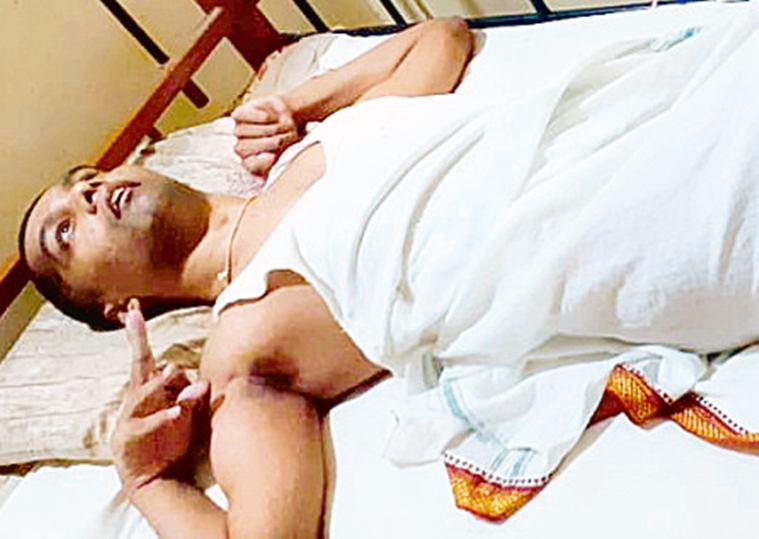
Home: Hubballi, Karnataka
NDA Tenure: January 2019 to April 2022
Injury: Cardiac arrest leading to hypoxic-ischemic encephalopathy (oxygen and blood deprivation in the brain)
Monthly Ex Gratia: Rs 40,000
Monthly Medical Expenses: Rs 40,000
Since July 2020, Kishan has been bedridden, with medical reports indicating over 90% nerve damage in his brain. Doctors attribute this to oxygen deprivation, with little hope for nerve regeneration.
His mother, Bharati Joshi, a former school teacher and single parent, manages his care alone. She ensures he is fed regularly, changes his urine bag and diapers, and monitors his condition. Physiotherapy has not yet started as the family only recently began receiving the ex gratia payment.
Bharati says Kishan was serving milk to his fellow cadets during breakfast when he became disoriented and collapsed. Medical records attribute his cardiac arrest to training. He spent two years receiving treatment at Military Hospital in Kirkee before his medical discharge in April 2022.
The incident left him completely bedridden. Bharati retired early to provide full-time care and plans to take him to Pune for another diagnosis, despite the challenges of travel with his condition. The family is also seeking an attendant to help with his care.
Kartik Sharma, 27
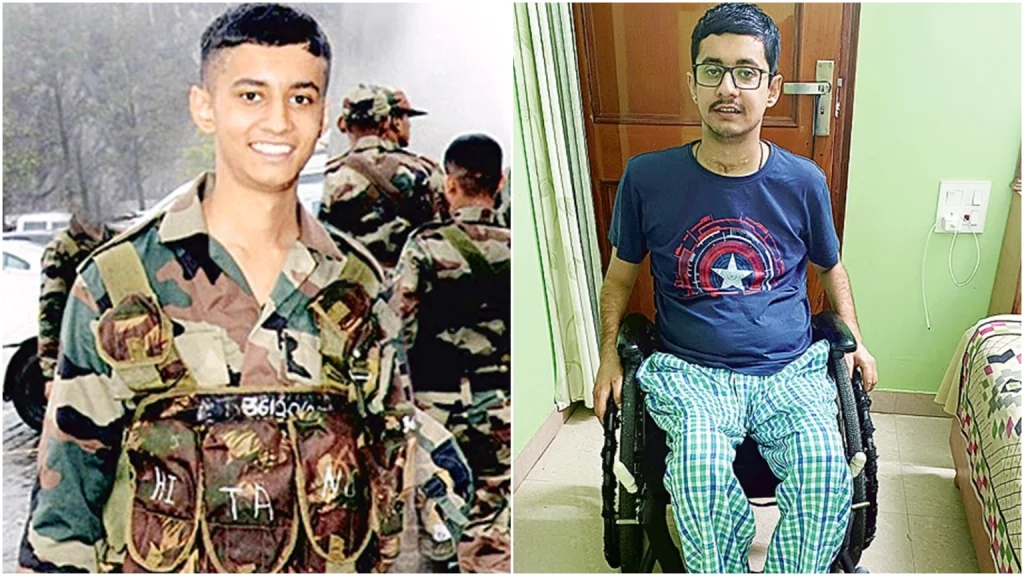
Home: Bilaspur, Himachal Pradesh
NDA Tenure: June 2015 to November 2021
Injury: Traumatic spinal cord injury with quadriplegia
Monthly Ex Gratia: Rs 40,000
Monthly Medical Expenses: Rs 40,000
Kartik, an alum of Sainik School Sujanpur Tira, was an Air Force cadet with dreams of becoming a fighter pilot. Today, he relies on an automatic wheelchair and an attendant for daily activities, as he cannot operate a manual chair.
His injury occurred in 2016 during a training exercise. Initially treated at Command Hospital in Pune, his condition worsened due to pneumonia, leading to an airlift to R&R Hospital in Delhi in March 2016. He spent over five years in rehabilitation at Military Hospital in Khirkee before being discharged in November 2021.
Kartik refuses to let his circumstances define him. He has pursued sports and academics, representing his state in para table tennis, earning a degree in political science, and working towards a master's in the same field through IGNOU. He has cleared the UGC NET and is preparing for the civil services exam.
Harish Sinhmar, 40
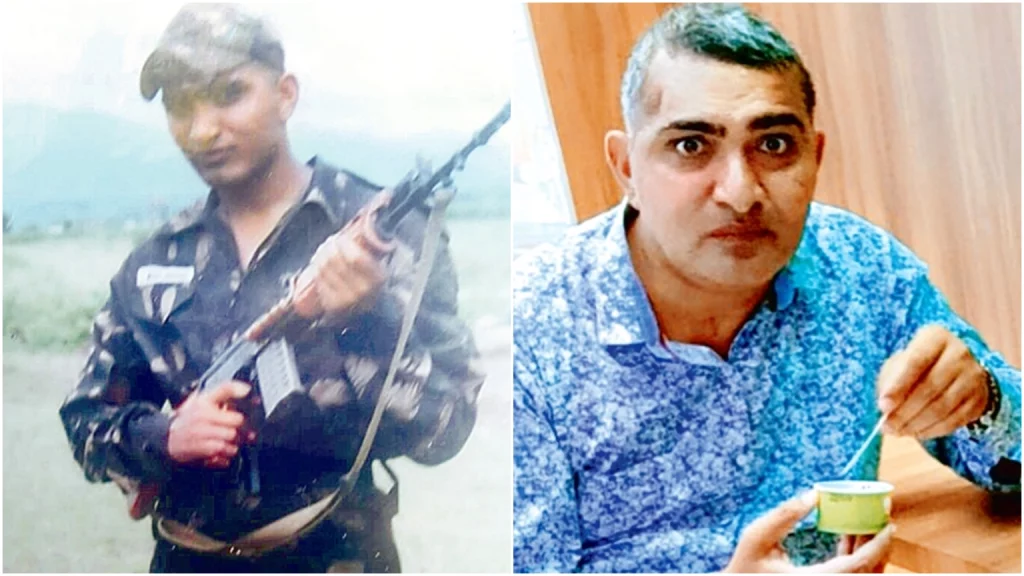
Home: Rohtak, Haryana
IMA Tenure: June 2006 to December 2007
Injury: Severe head injury
Monthly Ex Gratia: Rs 40,000
Monthly Medical Expenses: Rs 70,000
A graduate of Sainik School, Kunjpura (Haryana), Harish suffered a severe head injury during a boxing match at the Indian Military Academy in Dehradun. The injury necessitated brain surgery and led to a 42-day coma. Nearly 20 years after being discharged, he spends much of his time asleep—up to 15 hours daily—with little to engage him.
Harish can walk around his house and occasionally visit nearby stores, but he continues to feel the severe after-effects of his injury. “My mental health has suffered. Sometimes I collapse without warning, sometimes I lash out. I take regular medication for seizures, live with partial loss of motor control, memory lapses, and blurred vision,” he said.
He acknowledges feeling bitterness about his life's path. “My coursemates are Colonels now, and I don't have any friends from my IMA days. My parents still care for me, but for how long? My father even hopes I go before he does, so I am never left alone,” he shared quietly.
This serves as a stark reminder that behind the glory of military service are stories of sacrifice often unseen, and that a country's duty to its defenders must extend beyond the battlefield to ensure they live with dignity, care, and respect.
Conclusion
These narratives highlight the resilience and determination of young men who once trained to defend the nation and are now navigating life with courage despite life-altering injuries. From the parade grounds of elite military academies to the quiet confines of their homes, their journeys have taken unexpected turns, yet their spirit remains unbroken. Supported by their families and driven by memories of service, they continue to face each day with dignity. Their experiences serve as a testament to the commitment they once pledged and the strength they still possess, inspiring others with their perseverance and will to carry on.
(With Inputs from The Indian Express)



















